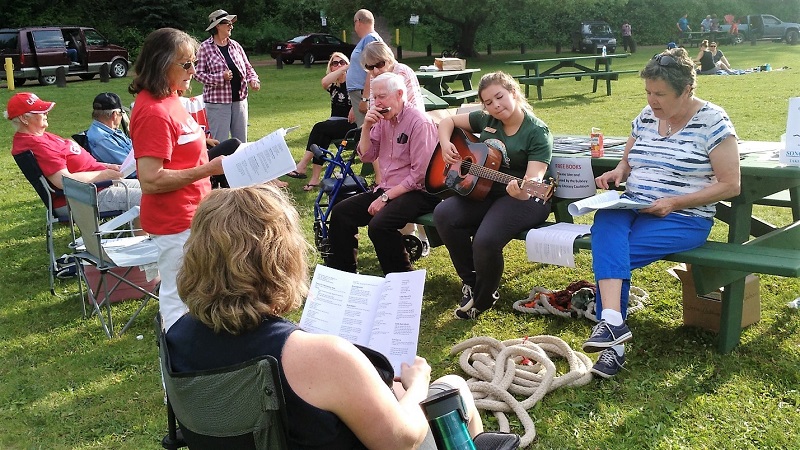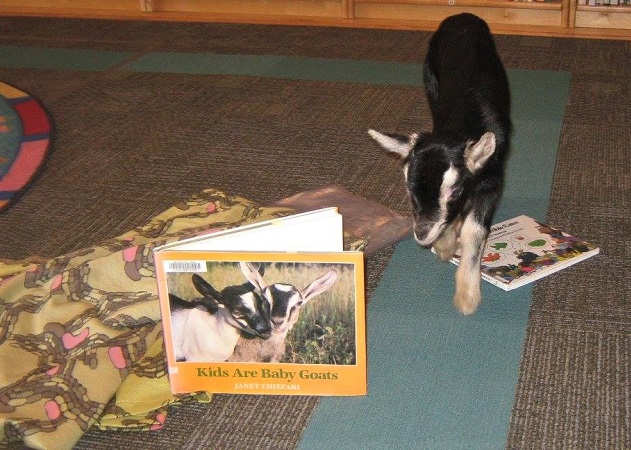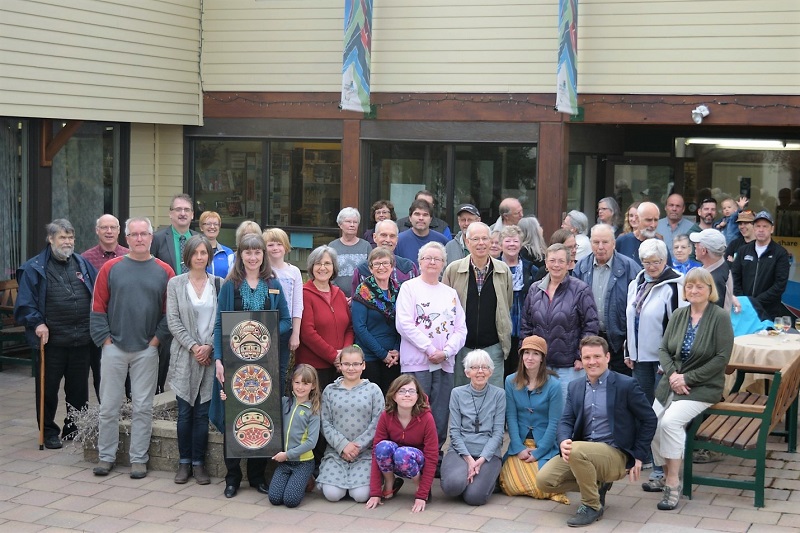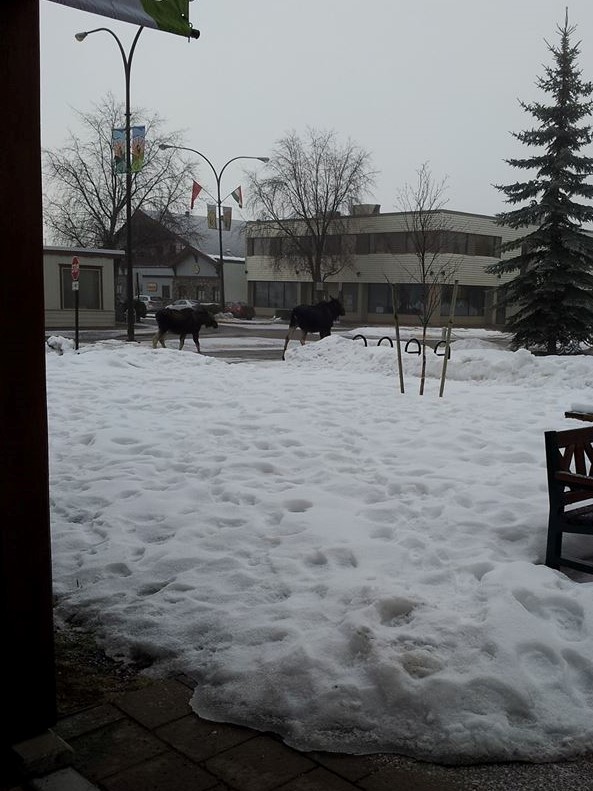Reflecting upon rural libraries reinforces the similarities between us and our large urban counterparts. The services we take pride in here in Smithers are, at their core, the same ones that libraries in Vancouver, Victoria or Surrey provide every day: matching programs, events, and collections to our specific community’s needs and interests; and working with other organizations to enrich the library’s offerings. Two of the variables that determine how each library realizes these goals are the individual character of their particular community and how that shapes the way in which they live and work together. It is these aspects that will be explored in the following lines, beginning with a look at our own library’s patrons.
Who We Are
 The Smithers Public Library, located in northern BC’s Bulkley Valley, is on the unceded traditional territory of the Gitdumden Clan and the Witsuwit’en Nation. The library serves the 5,400 residents of the town of Smithers plus several thousand more from the surrounding area. Smithers is a service hub for the village of Telkwa, Quick, rural farm and ranch families, and the reserve community of Witset. Over 10 per cent of Smithers’ population identify as Indigenous or Metis. Many more are Dutch, German or Swiss, and the town has adopted an alpine theme for Main Street.
The Smithers Public Library, located in northern BC’s Bulkley Valley, is on the unceded traditional territory of the Gitdumden Clan and the Witsuwit’en Nation. The library serves the 5,400 residents of the town of Smithers plus several thousand more from the surrounding area. Smithers is a service hub for the village of Telkwa, Quick, rural farm and ranch families, and the reserve community of Witset. Over 10 per cent of Smithers’ population identify as Indigenous or Metis. Many more are Dutch, German or Swiss, and the town has adopted an alpine theme for Main Street.
Servicing a large out-of-town population has resulted in Smithers having an unusually high number of amenities for such a small community. Events or performances are held nearly every day of the week, lessons and clubs abound, and various groups organise free community gatherings throughout the year, from National Aboriginal Day celebrations and the Fall Fair Parade, to the Main Street Festival and Christmas in the Valley complete with Santa, hot chocolate and horse-drawn wagon rides. Tourists come from around the region to ski Hudson Bay Mountain, and from farther afield to fly-fish for steelhead in the Bulkley River. It is not unusual to see fox, deer, bear and moose in and around town (and even a moose in the supermarket on one memorable occasion).
What We Do
Having grown up in Toronto, I am still surprised that patrons kick off their shoes and boots when entering the library. It is wonderful to see them so comfortable, treating it like the shared living room so many libraries aspire to become. In remote communities the public library is truly essential as a window to the wider world. Parents scour the stacks seeking to expand their children’s horizons, teens pick up a novel to discover they’re not alone, and seniors watch a 3-D printer demonstration, marvelling at the technology they’ve heard about on television, or listen to a speaker recount tales of exotic travels. Much as in a larger centre, the library brings the world to our community — but unlike a city, there is perhaps a greater need for this conduit for diversity in thought, lifestyle, and culture.
 Much of our programming mirrors that of other libraries, but some addresses our area’s rural aspect. Each year we partner in a Campfire Cookout & Singalong at the municipal campground. Young families and seniors arrive with their lawn chairs to sing silly camp songs and old ballads, play tug-o-war, and roast hot dogs and marshmallows donated by a local grocer. The event was born of a conversation about song as an early literacy tool, and what better way to build community than sitting around a fire together sharing food and blending our voices?
Much of our programming mirrors that of other libraries, but some addresses our area’s rural aspect. Each year we partner in a Campfire Cookout & Singalong at the municipal campground. Young families and seniors arrive with their lawn chairs to sing silly camp songs and old ballads, play tug-o-war, and roast hot dogs and marshmallows donated by a local grocer. The event was born of a conversation about song as an early literacy tool, and what better way to build community than sitting around a fire together sharing food and blending our voices?
Staff members have brought in their lambs and goats for special spring storytimes that delight children and caregivers alike. “In Our Backyard” was a popular series of presentations on winterizing engines, keeping chickens, canoeing, cheesemaking, hiking and more. The idea behind the series was a focus on local bounty and sustainability combined with an interest in reducing our carbon footprint.
For a couple of years the library staffed a booth at the annual fall fair and rodeo. People stopped to browse books on barn design, poultry, raising beef cattle, and preserving the harvest. Using a cell phone as a Wi-Fi hotspot, we were able to answer reference questions about beekeeping and horse breeds.
 Our collection is also influenced by our community. Acting on the advice of a local school librarian, we brought in children’s books about hunting and fishing to tempt middle-grade reluctant readers, with great success. Last year a young 4-H Club member donated half of the sale of his market pig to the library. We used the money to buy children’s books about raising pigs and other livestock. Mining and forestry are major industries in our region, and binders containing environmental assessment reports take up much of our reference section.
Our collection is also influenced by our community. Acting on the advice of a local school librarian, we brought in children’s books about hunting and fishing to tempt middle-grade reluctant readers, with great success. Last year a young 4-H Club member donated half of the sale of his market pig to the library. We used the money to buy children’s books about raising pigs and other livestock. Mining and forestry are major industries in our region, and binders containing environmental assessment reports take up much of our reference section.
Many people outside the town boundary do not have access to the Internet, or have dial-up service only. These patrons visit the library when in town to use the PACs or download eBooks and eAudiobooks. Last year over 21,000 PAC and Wi-Fi sessions were used onsite, decidedly quashing the myth that “everybody” has Internet service. Rural families commuting for a long day of errands drop in to give the kids a break with stories, LEGO or iPads and to stock up on reading and viewing materials. One-week loans would be inconvenient and difficult for our more distant patrons, so DVDs are lent out for the same three-week period as books and magazines.
How We Do It
Volunteers and Staff
 Small communities run on volunteer power, and Smithers is no exception. We are fortunate to have a Board with both newer members and several dedicated long-time trustees who served their maximum eight years, took the mandatory year off, then returned. Some volunteers – and staff – have been here for 40 years, and are as valuable a source of local history as any item to be found in the collection. We have had two generations in a family volunteering in the library together, and two generations working in staff positions at the same time as a sibling was helping out as a VolunTeen.
Small communities run on volunteer power, and Smithers is no exception. We are fortunate to have a Board with both newer members and several dedicated long-time trustees who served their maximum eight years, took the mandatory year off, then returned. Some volunteers – and staff – have been here for 40 years, and are as valuable a source of local history as any item to be found in the collection. We have had two generations in a family volunteering in the library together, and two generations working in staff positions at the same time as a sibling was helping out as a VolunTeen.
The library’s VolunTeens help the Children & Youth Programmer plan, prepare, and deliver special events for little ones, such as the Haunted Library that drew nearly 200 people this year, or science-themed non-instructional day programs where the youth demonstrate their experiments and assist with hands-on activities. While all of our volunteers help the library, our focus with a few is more about helping them by providing social scaffolding, and the library is a big part of their lives.
Our Friends of the Library group is small but hard-working and devoted. Each year they bring in an astounding amount of money through grant applications, soliciting local businesses, and book sales – over $28,000 in 2016. They use their community contacts to tirelessly advocate for the library, requesting donations and assistance with specific projects. Our Friends significantly extend the library’s service capacity.
Most of our staff are long-time Smithereens and know the community inside-out. They bring their knowledge of community members’ individual skills and talents to bear on everything from potential speakers and information sources to building repairs. The staff provide an endless source of great ideas, from circulating Tech Kits to livestreaming concerts, and their varied areas of interest keep the library’s programs and collection balanced.
Organizational Relationships
 Our library is in constant collaboration with other organizations, from the local GLAM sector and educational institutions to the homeless shelter and regional health network. A truth and reconciliation event we organized this summer involved 15 community partners, and it is not unusual to find us at a planning meeting with seven or eight other organizations. Partnering is easy to do in a small town where everyone regularly bumps into each other and can pop out to share an idea or meet for coffee just a few blocks away. I find that small organizations are often more nimble than larger ones – willing to squeeze things in on short notice, accept imperfection in order to move ahead, and take a chance on something new and unproven.
Our library is in constant collaboration with other organizations, from the local GLAM sector and educational institutions to the homeless shelter and regional health network. A truth and reconciliation event we organized this summer involved 15 community partners, and it is not unusual to find us at a planning meeting with seven or eight other organizations. Partnering is easy to do in a small town where everyone regularly bumps into each other and can pop out to share an idea or meet for coffee just a few blocks away. I find that small organizations are often more nimble than larger ones – willing to squeeze things in on short notice, accept imperfection in order to move ahead, and take a chance on something new and unproven.
In a small town we also have the opportunity to develop and maintain close relationships with our funders, such as local politicians, foundations, and service clubs, whom we meet at various community events or at library programs with their children. As we come to learn their areas of interest we are able to draw specific library news to their attention in passing, keeping them informed throughout the year. Councillors may sit on multiple boards throughout the community and can see our work first-hand through various partnership projects.
Libraries that are off the beaten track rely heavily on our federations for financial assistance with travel expenses to attend distant training opportunities and with author tours. As a Northwest Library Federation member, we have been able to host readings by such authors as Eden Robinson and Gwynne Dyer that would have been beyond our individual means. Beyond the efficiency of coordinating and subsidizing tours, belonging to a library federation has broadened our understanding of the region as a whole and developed a network of expertise and support between isolated libraries.
Working in a small community
 Much as a medieval village had its butcher and baker, we fill the role of “librarian” in our community. Because everyone knows who we are and what we do, whether or not we’ve met before, we are always unofficially representing the library. Many a time I have attended an event or public meeting and been greeted with “It’s good to see the library here!” Being interrogated while grocery shopping is part of the job, but for every tough question there are dozens of interactions that leave me glowing, including spontaneous hugs from children who recognise one of “the librarians” (Which brings me to another bonus of rural library services: in the eyes of our community, all of us are librarians, whether or not we have a degree. People here don’t know or care what a Library Technician is; as far as they’re concerned if we’re doing the job we’re a librarian, and that’s that.).
Much as a medieval village had its butcher and baker, we fill the role of “librarian” in our community. Because everyone knows who we are and what we do, whether or not we’ve met before, we are always unofficially representing the library. Many a time I have attended an event or public meeting and been greeted with “It’s good to see the library here!” Being interrogated while grocery shopping is part of the job, but for every tough question there are dozens of interactions that leave me glowing, including spontaneous hugs from children who recognise one of “the librarians” (Which brings me to another bonus of rural library services: in the eyes of our community, all of us are librarians, whether or not we have a degree. People here don’t know or care what a Library Technician is; as far as they’re concerned if we’re doing the job we’re a librarian, and that’s that.).
The privilege of being in this role means that we are always listening, learning, and looking for opportunities to connect with people; for information, funding, partnerships, and volunteer speakers. For many of us in small communities, our work, whether paid or volunteer, is woven throughout much of our life.
People in small towns often wear many hats and have more than one connection with each other. A Board member might be our employer but also work for a funding body such as a business donor, or play on our hockey team. The MP or MLA’s child could be the neighbourhood babysitter, a co-worker might coach our children on weekends, and that difficult patron might also be your neighbour and bank teller. We cross paths with our homeless patrons daily on the street. Individuals are forced into close proximity with others that they might not normally encounter in a larger centre, and people become familiar in passing to the point where we begin to greet each other, not quite certain where we’ve met before.
 For me, the most satisfying part of working in a small community is the ability to see our direct impact. The feedback loop here is short. As in larger libraries, we hear follow-up stories after programs and events, discover whether a patron enjoyed the book or DVD we recommended, watch children grow up, and greet our regular patrons by name.
For me, the most satisfying part of working in a small community is the ability to see our direct impact. The feedback loop here is short. As in larger libraries, we hear follow-up stories after programs and events, discover whether a patron enjoyed the book or DVD we recommended, watch children grow up, and greet our regular patrons by name.
In a town of this size, however, there is so much social overlap that we are sometimes made aware of people’s progress and growth over time through our partnerships with other organizations. We enjoy a bird’s-eye view of the community we serve, and a strong sense of being an active partner in its development.
Like larger libraries, we provide opportunities for community members to gain a better understanding of their place in the world and in history. The Bulkley Valley’s large Indigenous population makes truth and reconciliation particularly relevant here. Much of a public library’s collection and programming are piecemeal attempts to answer humankind’s most enduring questions about life, the universe, and everything.
In a small community perhaps the most important of these questions is “How should we live together?” In the end, connecting our patrons with the background, perspective, and opportunities to shape their own answer may be the purpose of all public libraries, with each one’s content, support, and method of delivery coloured by the unique community they serve.
> Wendy Wright is the Director of the Smithers Public Library. She has volunteered in Denman Island’s Dora Drinkwater Library and worked in various branches of Vancouver Island Regional Library, including Hornby Island where she once presented a chicken-themed storytime featuring live poultry. Wendy holds a Library Technician diploma and CLTP certificate. Previously she worked as a long-time bookseller and a publisher’s representative.
> In 2017, the Smithers Public Library received the inaugural BCLA Building Better Communities Award.
Project Coordinator, BCLA

